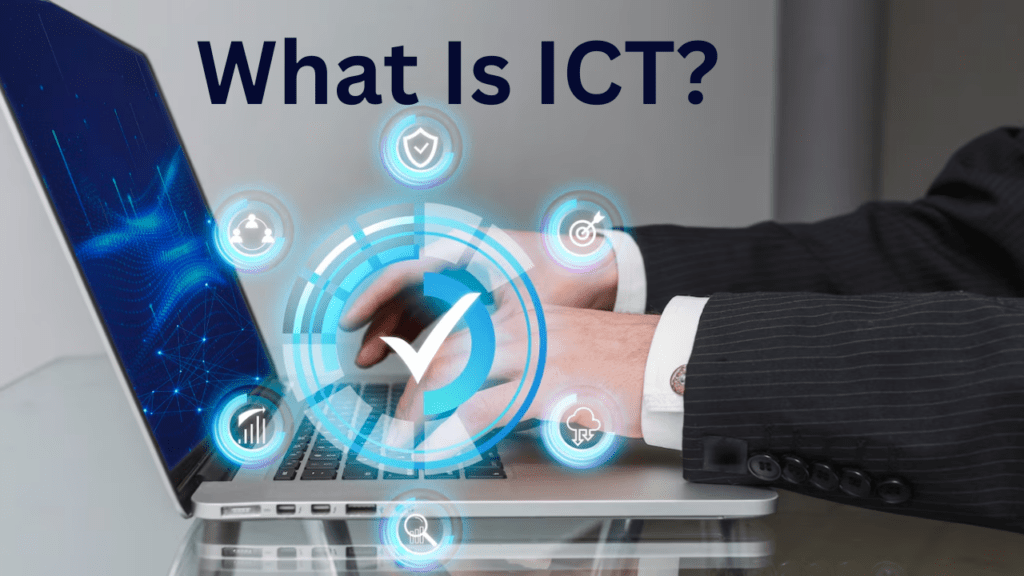What is ICT? A Deep Dive into Information and Communication Technology

“The great growling engine of change – technology.” – Alvin Toffler
ICT, or Information and Communication Technology, combines technology and communication tools to transform how we connect, work, and learn. From smartphones to telemedicine, ICT powers our modern lives.
Did you know that 96% of U.S. adults use the internet, and the federal government has allocated $75 billion for IT spending in 2025? These numbers highlight the pivotal role ICT plays in shaping industries and connecting communities nationwide.
At CCI Training, we empower individuals to thrive in the ICT-driven world with career-focused programs. Whether you want to enter tech or enhance your skills, ICT offers endless opportunities to succeed in today’s connected era.
What is ICT and Why Does it Matter?
ICT Defined
ICT is the driving force of the digital world. It connects people, ideas, and innovations, powering industries and global economies. From real-time communication to transforming businesses, ICT is essential to modern life.
Did you know? As of 2023, 87% of U.S. households have internet access, underscoring the critical role of ICT in everyday connectivity.
Why does it matter? Let’s break it down:
- Connectivity: It powers global communication through the internet and mobile networks.
- Data Exchange: Seamlessly transfers information across platforms and devices.
- Collaboration: Enables remote work, online meetings, and global teamwork.
- Innovation: Drives new technologies and digital services across all sectors.
Key Components of ICT
ICT is a combination of different layers working together to create a seamless digital experience. These components are:
- Technology: Hardware (smartphones, computers, servers) and software (apps, operating systems, databases) are the backbone of ICT infrastructure.
- Communication: This includes the internet, mobile networks, and data transmission, which ensure smooth interaction between devices and people.
- Integration: The magic happens when these components merge, creating an ecosystem where data flows freely across platforms, connecting everything from smart devices to cloud-based applications.
ICT in Action
When we talk about what is ICT information communication technology in action, we’re looking at tangible, game-changing applications that are transforming industries. Here are just a few real-world examples:
- E-Learning: Students across the globe access education through virtual classrooms and online resources, breaking geographical barriers.
- Mobile Banking: With just a tap, users manage accounts, pay bills, and make transfers on mobile apps—efficiency at its best.
- Smart Cities: Urban hubs are evolving, using ICT to manage traffic, energy, and public services, making them more efficient and sustainable.
ICT isn’t just a buzzword—it’s the driving force behind how the world works today.
Why ICT is the Backbone of Modern Society
“Technology is best when it brings people together.” – Matt Mullenweg
ICT is the backbone that powers industries, driving automation and global connectivity. It makes the world more efficient, accessible, and interconnected.
How can businesses thrive without it? From healthcare to education, ICT is reshaping every sector and unlocking new opportunities.
Transforming Industries
| Industry | How ICT is Changing It |
|---|---|
| Business | ICT drives automation, facilitates e-commerce, and enables global collaboration, making businesses agile and scalable. |
| Healthcare | With telemedicine, AI in diagnostics, and digital data storage, ICT enhances patient care and operational efficiency. |
| Education | Virtual classrooms, digital libraries, and EdTech tools provide students with access to quality education from anywhere. |
Enabling Digital Inclusion
ICT is crucial in bridging the digital divide worldwide, ensuring access to essential services for all. But what is ICT technology in this context? It’s the system that connects remote communities, opening doors to education, healthcare, and job opportunities.
- Bridging the Digital Divide: In developing regions, ICT helps connect people to the internet, enabling growth and access to resources.
- Access to Essential Services: ICT powers services like mobile banking and e-government, improving lives globally.
ICT is transforming society, creating new opportunities, and connecting people across industries, from healthcare to business.
ICT vs. IT: The Critical Difference
While ICT and IT are often used interchangeably, they serve distinct purposes in the tech landscape. Let’s break down the key differences between the two.
IT vs. ICT – What Sets Them Apart?
What is ICT? Simply put, Information and Communication Technology combines the power of both technology and communication to create a seamless global network. IT (Information Technology), on the other hand, focuses purely on technology management—hardware, software, and data systems.
So, what is ICT in communication? It’s the integration of communication systems (like internet and mobile networks) into IT frameworks, enabling real-time connectivity across the globe. ICT expands IT into a global connectivity powerhouse, fostering collaboration, accessibility, and growth.
Did you know? As of 2023, over 80% of Americans own a smartphone, emphasizing how ICT influences communication and connectivity
Want to dive deeper? Learn more in our blog, Difference Between ICT and IT.
This distinction is key—ICT isn’t just about technology; it’s about how we use that technology to connect, communicate, and innovate on a global scale.
Emerging Trends in ICT You Need to Know
AI Meets ICT
AI is transforming ICT technology with smarter systems and predictive analytics that improve decision-making and efficiency. From chatbots to intelligent networks, AI enhances information technology communication, making processes faster and more user-friendly.
In 2024, 77% of U.S. businesses are expected to adopt AI to boost efficiency and innovation
5G Revolutionizing ICT
5G technology is transforming ICT by enabling faster networks that power real-time communication and support the growing IoT ecosystem. With ultra-low latency, 5G boosts productivity and enhances user experiences.
The number of 5G subscriptions in North America is expected to reach nearly 432 million by 2029, with global 5G mobile subscriptions reaching 314 million in 2024, a significant jump from the previous year.
ICT and Cloud Computing
Cloud solutions are making ICT scalable, accessible, and efficient by offering flexible resources and enhancing information technology communication. Cloud adoption allows businesses to streamline operations while reducing infrastructure costs.
In the U.S., federal agencies have significantly increased their cloud computing investments, with spending reaching $10.8 billion in Fiscal Year 2021, up from $9.2 billion in FY 2020 and $7.6 billion in FY 2019.
This trend underscores the critical role of cloud adoption in modernizing government operations and improving service delivery.
IoT and ICT Integration
The integration of IoT and ICT is revolutionizing daily life, from smart homes to wearable devices. ICT technology connects these devices, making them smarter and more interactive, creating a seamless digital experience.
Over 30 billion IoT devices are expected to be connected by 2025, demonstrating the explosive growth of ICT in communication.
Careers in ICT: Unlocking the Digital Future
Growing Opportunities in ICT
The ICT industry is booming, offering a wide range of career opportunities in various fields. Popular roles include:
- ICT Managers: Overseeing technology strategies and infrastructure.
- Cloud Specialists: Managing cloud platforms and ensuring seamless data storage solutions.
- Network Engineers: Designing and maintaining reliable network infrastructures.
As ICT technology continues to evolve, the demand for skilled professionals is skyrocketing. CCI Training offers training programs designed to equip you with the skills to thrive in these high-demand roles.
Skills You Need to Succeed in ICT
Success in ICT requires a blend of technical expertise and soft skills. Whether you’re setting up networks or protecting data, mastering the following skills will give you a competitive edge in the industry:
| Skill | Why It’s Essential |
|---|---|
| Networking | Core to setting up and maintaining seamless communication between devices. |
| Cybersecurity | Protects sensitive data from cyber threats and vulnerabilities. Learn more about cybersecurity program. |
| Communication | Key to explaining technical concepts clearly and working effectively in teams. |
| Problem-Solving | Crucial for diagnosing issues and finding innovative solutions. |
| Cloud Computing | Understanding cloud platforms is essential for modern business operations. Learn more about cloud computing program. |
CCI Training equips you with all the necessary tools to master these skills and prepare for a successful career in ICT.
Certifications to Kickstart Your ICT Career
Certifications can set you apart in the competitive ICT technology field. Below are some of the most recognized certifications that can help you stand out:
| Certification | Description | Benefit |
|---|---|---|
| CompTIA | Validates foundational ICT knowledge and skills. | Essential for entry-level roles in ICT. |
| CCNA (Cisco Certified Network Associate) | Specializes in networking and network infrastructure. | Opens doors to networking and systems administration jobs. |
| CISSP (Certified Information Systems Security Professional) | Focuses on cybersecurity and data protection. | Highly sought after in the field of information security. |
In the U.S., over 80% of employers indicate that candidates with ICT certifications are more likely to be hired for tech roles.
At CCI Training, we offer certification programs that provide you with the knowledge and expertise to excel in ICT careers.
Final Thoughts
ICT is more than just technology—it’s the backbone that connects the world. From revolutionizing industries to bridging global divides, ICT technology enables seamless communication, innovation, and growth. Understanding its impact and potential is key to staying ahead in today’s digital landscape.
Ready to kickstart your ICT career? CCI Training Center offers comprehensive IT programs and certifications to help you develop the skills you need to succeed in the dynamic world of information technology communication. Get started today!
Program Offered
- Pharmacy Technician Training
- Online Medical Assistant
- Medical Billing and Coding Specialist Program
- Cloud Computing Technician Training
- Computer Network Technician
- Business and Accounting
- Radiology Technician Training
- Medical Assistant Program
- Computer Support Technician
- Cybersecurity Program
- Virtual Assistant Training

This article is written by
Share this article
Program Offered
- Pharmacy Technician Training
- Online Medical Assistant
- Medical Billing and Coding Specialist Program
- Cloud Computing Technician Training
- Computer Network Technician
- Business and Accounting
- Radiology Technician Training
- Medical Assistant Program
- Computer Support Technician
- Cybersecurity Program
- Virtual Assistant Training

This article is written by
Share this article
Frequently Asked Questions FAQ's
What Are the Main Types of ICT?
ICT technology isn’t one-size-fits-all. It’s divided into key areas to serve different needs:
- Personal ICT: Devices and applications used for personal tasks—smartphones, tablets, and home computing.
- Industrial ICT: Technologies used in manufacturing, logistics, and production processes to improve efficiency and automation.
- Educational ICT: Digital tools enhancing learning—online courses, virtual classrooms, and collaborative platforms for students and teachers.
These categories shape what ICT means in everyday life and industry.
How Does ICT Impact Developing Nations?
ICT in communication is a game changer for developing nations. It brings:
- New Economic Opportunities: Mobile money and digital marketplaces are fueling entrepreneurship.
- Healthcare Advancements: Telemedicine and e-health platforms improve access to medical services.
- Education Transformation: Digital learning platforms break down geographical barriers, providing education to remote areas.
For developing nations, ICT information technology communication acts as a vital tool for growth and development.
Challenges in ICT Adoption
The road to widespread ICT adoption isn’t without bumps:
- Cybersecurity Risks: With more systems connected, data protection becomes a major concern.
- High Costs: Implementing advanced ICT technology requires significant financial investment, making it difficult for smaller businesses to compete.
- Infrastructure Issues: In many regions, reliable internet access and power infrastructure are still lacking, limiting ICT in communication reach.
While ICT offers immense potential, overcoming these barriers is crucial for its effective use globally.
Related Articles







CCI Training Center Proudly Completes
41 Years in Career Training Services










